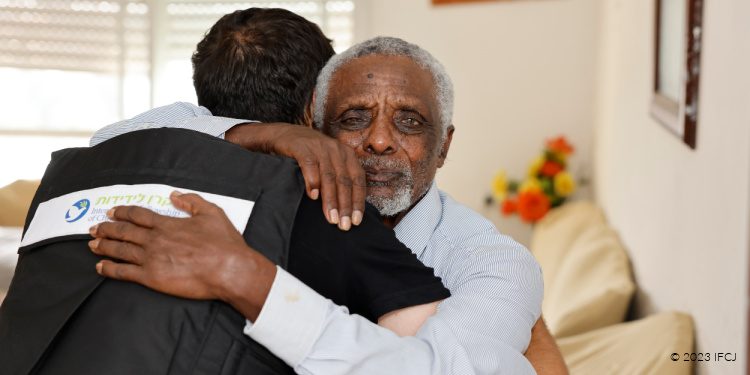The Pain of His People
Yael Eckstein | February 15, 2024

Moses and Aaron, Nadab and Abihu, and the seventy elders of Israel went up and saw the God of Israel. Under his feet was something like a pavement made of lapis lazuli, as bright blue as the sky. — Exodus 24:9-10
Each week in synagogue, Jews read through the Torah from Genesis to Deuteronomy. The Torah portion for this week is Mishpatim, which means “laws,” from Exodus 21:1–24:18.
In our home, like most Jewish homes, we have multiple tzedakah boxes—receptacles to place money for charity—throughout the house. They encourage giving and generosity in our children. Moreover, they serve as a constant reminder that no matter how comfortable we are in our homes, there are others who are suffering—and we can never forget them.
In this week’s Torah portion, we read that Moses and the men with him beheld a vision of God in which, “Under his feet was something like a pavement made of lapis lazuli.” The Jewish sages explain that the pavement was a brick that God kept with Him at all times while the children of Israel were enslaved in Egypt. The brick was a symbol of their suffering, and by keeping it in His presence, their pain was always on His mind.
Moses and Aaron, Nadab and Abihu, and the seventy elders of Israel went up and saw the God of Israel. Under his feet was something like a pavement made of lapis lazuli, as bright blue as the sky. — Exodus 24:9-10
The Pain of His People
Now, of course God didn’t really need any brick to help Him remember the suffering of the Israelites. However, this vision of God teaches us an important lesson about empathy.
Empathy is different than sympathy. Sympathy is acknowledging someone’s pain. Empathy is feeling someone else’s pain. When the verse tells us that God’s feet were resting on the pavement, it means that God felt the pain of His people. When they suffered, He felt it—their pain was always on His mind.
It is essential that we make empathy a part of our daily lives, but it’s not always easy. It’s hard to relate to the hungry when our refrigerators are full. It’s hard to feel the pain of the homeless when we are in the comfort of our homes. And it’s difficult to remember the bitterness of loneliness when we are surrounded by family. However, with a bit of effort, we can ensure that we don’t become complacent.
There are many ways to stay connected to the suffering of others. We can place physical reminders in our homes, such as charity boxes, and we can stay informed through organizations such as The Fellowship. In this way, we will never become indifferent to the pain of others. Rather, we will do everything we can to alleviate their suffering and make a difference in the world.
Your Turn:
What are your suggestions for cultivating empathy, both for our friends and family who might be going through hard times and for people suffering around the world? Share your thoughts in the comment section below.
